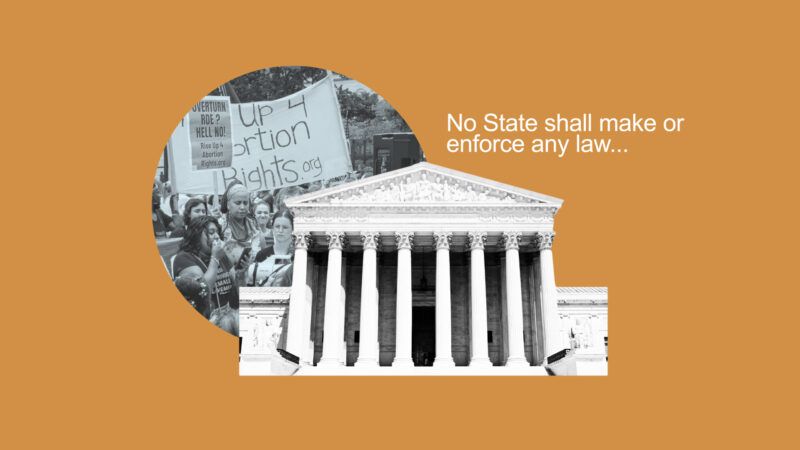Abortion Rights Under the 9th and 14th Amendments
Understanding what Justice Alito got wrong in Dobbs v. Jackson Women’s Health Organization

Justice Samuel Alito's opinion in Dobbs v. Jackson Women's Health Organization argued that the constitutional right to abortion must be eliminated so that state governments may enjoy free rein to criminalize abortion as they see fit.
The problem with Alito's opinion is that it stands at odds with the text and history of the 14th Amendment, which says: "No State shall make or enforce any law which shall abridge the privileges or immunities of citizens of the United States; nor shall any State deprive any person of life, liberty, or property, without due process of law." As its drafting and ratification history demonstrate, the 14th Amendment was originally understood to protect a broad range of individual rights from state infringement, including unenumerated rights.
Consider the words of Sen. Jacob Howard (R–Mich.), who introduced the 14th Amendment in the Senate in 1866 and spearheaded its passage through that chamber. The 14th Amendment was needed, Howard explained in a speech that was widely reprinted throughout the country, because the "mass of privileges, immunities, and rights" secured by the Constitution "do not operate in the slightest degree as a restraint or prohibition upon State legislation."
Howard was right about that. Remember that the Bill of Rights originally applied only against the federal government. The First Amendment, which begins, "Congress shall make no law," was quite explicit on this point. So, Howard continued, "the great object of the first section of this [14th] amendment is, therefore, to restrict the power of the States and compel them at all times to respect these great fundamental guarantees."
What "great fundamental guarantees" and what "mass of privileges, immunities, and rights" was the 14th Amendment designed to protect from state abuse? For starters, Howard said, the amendment protected fundamental rights that were not explicitly spelled out in the Constitution. "These privileges and immunities," Howard said, "are not and cannot be fully defined in their precise nature." In addition, he continued, "to these should be added the personal rights guaranteed and secured by the first eight amendments of the Constitution." In short, the 14th Amendment compels the states to respect both "the first eight amendments" (enumerated rights) and other fundamental rights that "are not and cannot be fully defined" (unenumerated rights).
Which brings us to the legal debate over abortion. Thanks to the 14th Amendment's ratification in 1868, every state must now respect the right to freedom of speech, the right to keep and bear arms, and so on down the line of individual liberties mentioned in the Bill of Rights. But that is not the end of it. The states must also respect the individual liberties guaranteed by the Ninth Amendment, which reads, "The enumeration in the Constitution of certain rights shall not be construed to deny or disparage others retained by the people." Those unenumerated rights "retained by the people" are part of the great mass of liberties that "are not and cannot be fully defined." The Ninth Amendment's inclusion in the Bill of Rights makes the unwritten liberties that it protects "fundamental" by definition.
Now we reach the key question: Do abortion rights fall under the protection of the Ninth Amendment? If the answer to that is yes, then that means that abortion rights apply against the states via the 14th Amendment.
My answer to the key question, which I recently spelled out at length, is this: "Founding era history strongly supports the view that abortion rights, at least during the early stages of pregnancy, do fall within the orbit of Madison's Ninth Amendment." What that means is that Alito's abortion opinion got both the Ninth Amendment and the 14th Amendment wrong.

Show Comments (174)